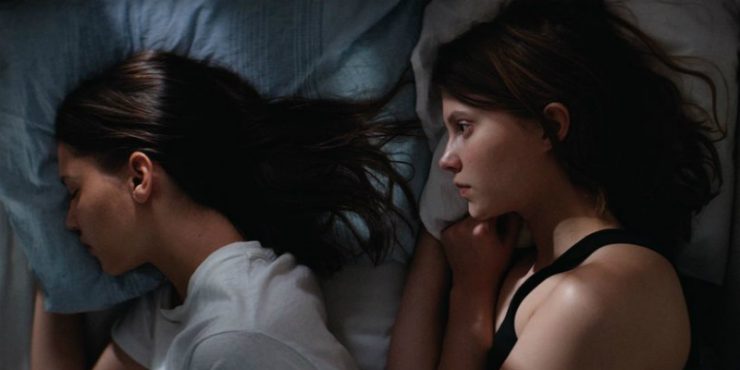The mental landscape of Joachim Trier’s characters is frightful. Often they’re circumstances lead them into a depression. Medication, whether self-inflicted or otherwise, is a resort many of his characters take to. In Thelma, a young girl played by Eili Harboe is plagued with seizures upon arriving at university. Growing up sheltered, with two parents who raised her in a strict Christian household, she does not know how to react to everything she experiences when she’s on her own for the first time. This young girl is the titular Thelma, the center of Trier’s first major plunge into genre. Like his other films, Thelma is about the loneliness of adolescence, the trauma that can come with growing up, but this film also dabbles in the supernatural to uneven results.
When Thelma meets a fellow student, Anja (Kaya Wilkins), in the school’s library, she’s immediately and viciously struck by a debilitating seizure. She wakes up in the hospital, unsure of what caused it. One thing she doesn’t understand quite yet is her strong, emotional feelings for Anja. She doesn’t really understand any emotion, but having feelings for another woman is not only unfamiliat, but against the draconian religious upbringing she received from her parents, Trond (Henrik Rafaelsen) and Unni (Ellen Dorrit Petersen). Even more strange are Thelma’s visions. In her dreams, she can see people disappearing, she can see animals attacking those she knows and loves, she can move objects with her mind. Sometimes, these dreams come true.
Thelma works better as a Trier film than a supernatural horror. It reminded me a lot of Jeff Nichols’ 2011 film, Take Shelter, which also took an interesting tact toward conflating mental illness with science fiction. Shelter was a much stronger film, and Thelma sometimes gets bogged down in its religious themes. Trier’s focus on Christianity should remind some of Ingmar Bergman’s films, but his eye for theological conception isn’t as strong as the Swedish master. When Thelma focuses on the main character’s romantic entanglements, Trier’s gift for displaying his characters at their most distraught shows. Harboe’s performance is strong, as is Trier’s wistful eye behind the camera and clever cutting. But unfortunately, this is the Norwegian director’s least interesting film, the one most disrupted by its ideas, which is a shame because it might be his most thematically ambitious.
Directed by Jochim Trier










